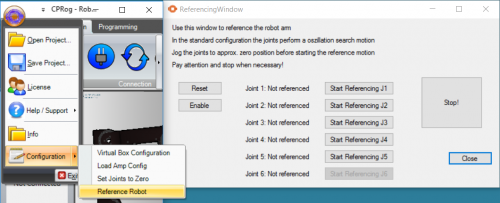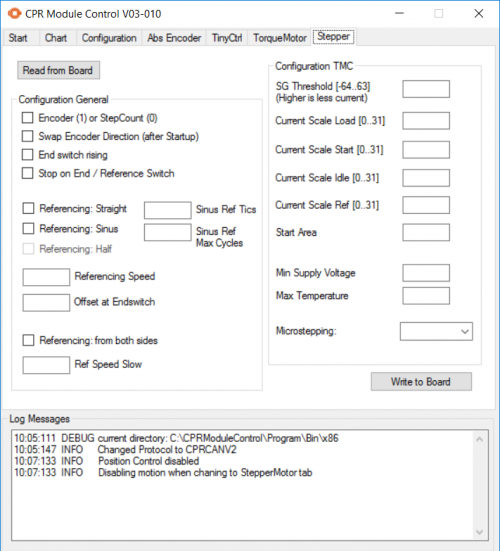Referencing robolink
The robolink arms provide reference switches which allow precise and reproducible referencing. This page shows how the referencing is done and how it can be adapted.
Why is this necessary? The joint electronics store the last position of the robot also during power off. However, if the joints are moved by e.g. gravity or manual force when the robot is switched off, then the reference position is no longer valid. Hence, collisions might occur when a program is started. Therefore once can only move the robot in Cartesian mode the Cartesian motion or start a program, if the robot has performed the referencing operation after start up.
Referencing Operation
The robot should be jogged manually close to the reference switches, then the referencing is initiated. In the standard configuration the single joints will then perform a sweep motion with increasing amplitude until it finds the reference switch. Then it performs a slower approach motion from both sides of the reference point to precisely find the center of the reference point.
A video containing the referencing process is here: Referencing and slow motion video (66MB)
- Switch on the robot and start CPRog
- Click Connect / Reset / Enable to activate the robot. Now the status light in the left column of CPRog is green.
- Jog the robot arm on the or close to the reference switches using the jog (A1 +/-, A2 +/-,...) buttons at the bottom of the CPRog Window. Indication:
- The orange light on the stepper modules of the the control electronics light up when the reference point is reached.
- In the version with motor encoder the reference switch on the robot lights up in yellow color.
- Open the referencing dialog by pressing on the button "Configuration \ Reference Robot" in the menu accessible via the upper left circle (see image on the right).
- The robot has to be Enabled to start referencing (see first step)
- Reference the first joint:
- Ensure that the joint can move without collision.
- Press the "Start Referencing Joint 1" button in the dialog
- Wait until the reference motion ended
- Now the status in front of the button should have changed to "Referenced"
- Proceed with the other joints in the same way. You can also reference several joints at the same time.
- When all joints are referenced you can close the dialog and proceed to use the robot.
- You will need to Reset and Enable the robot (just like in step 1) after finishing the referencing operation.
Potential Pitfalls
- The joint cannot be jogged to the reference switch due to the joint limit: Set the joint positions to the zero position with the menu button "Configuration / Set Joints to Zero". Then press "Reset" and "Enable" and proceed.
Modifying the reference motion
The type of reference motion and the parameters can be modified using the ModuleCtrl tool.
The following parameters can be changed:
- Type of reference search motion:
- Straight: Motion in one direction until the reference switch is reached
- Sinus: Sweep motion with increasing amplitude until the reference switch is reached
- None: No reference motion, the module is tagged as "Referenced" directly after start up
- Referencing from both sides: When ticked, the module performs a slow search motion to find the edges on both sides of the reference point. It calculates the center out of these values. This procedure provides higher precision.
- Referencing velocities:
- Referencing speed: used for the search motion
- Ref speed slow: used for the slow search motion from both sides, when ticked.
- Sinus parameter:
- Sinus ref tics: increase of the amplitude in each cycle
- Sinus ref max cycles: how many search cycles are performed
- Offset at end switch: This position is set when the end switch is reached, see Define the zero position offsets.
To change the above parameters, download the ModuleCtrl configuration software.
- Start the ModuleCtrl software.
- Press the "Connect" button
- Choose the module you want to work on: Joint1 = CAN-ID 0x10, Joint2 = CAN-ID 0x20, ...
- There should be a status message with some error messages now.
- Switch to the "Stepper" tab
- Press "Read from Board" to transfer the parameters from the board to the software.
- Change the parameter - !! be careful not to make big changes to the current parameters !!
- Press "Write to Board" to save the parameter.
- (Power cycle the robot, if you have changed the encoder direction.)
For questions or comments please get in contact with us: info(at)cpr-robots.com

